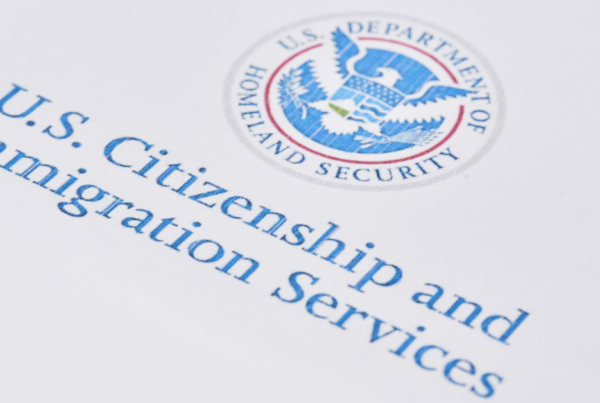
Receiving a deportation order is terrifying particularly if that order splits you from family members and especially if you are just eleven years old like this child was. This recent headline has sparked a significant number of questions from immigrants and family members of immigrants, so today we want to talk about what to do if you are faced with a deportation order.
Deportation Order: What to Do If You’re Faced with One
First thing is first, what is a deportation order?
A deportation order is an order for a foreign-born person to be deported back to their country of origin. This order is issued by the United States government. A deportation order is also often referred to as a “removal”. A removal may refer to you as either being “inadmissible” or “removable”. You are likely to be referred to as “inadmissible” if you are still in the process of trying to legally live within the U.S. for example if your application for permanent residence is still pending. You are more likely to be referred to as “removable” if you already have legal residence within the United States, for example, if you already have your green card.
Reasons For a Deportation Order
There is a whole range of reasons why a deportation order may be issued, these include:
- Having a Green Card that has expired
- The commission of certain types of crimes (for example, aggravated felonies)
- Failure to obey the terms of your immigration visa
What Should You Do When You Receive a Deportation Order?
If you have received a deportation order, the first and most important thing to do is to contact an immigration attorney to represent you. An immigration attorney can help you to get more details on why the deportation order was issued, whether the issue is valid, can advise you on what to do next, and can guide you through those steps.
What Happens Next?
After you have retained an immigration attorney to represent you, they will begin gathering as much information as possible about your case. This will help you to prepare for the court hearing that is likely approaching. Almost all deportation orders are issued with a court date. At this court appearance, an immigration judge will determine whether or not your deportation order is valid or whether deportation is not an appropriate resolution for the issue at hand. If you have retained an immigration rights attorney, they will help you to prepare for this hearing.
Once the hearing begins, an attorney representing the United States government will attempt to prove to the judge that there is good reason for you to be removed from the country. If the attorney is unable to prove good cause for your removal, the judge is unlikely to uphold the request for deportation. If the government attorney is able to prove that there is good cause for deportation, it will be up to you to provide an affirmative defense OR submit a request for relief of removal. This is why it’s so important to have an experienced immigration attorney on your side – they can help you to prepare your defense or instruct you on the process of requesting relief of removal.
How Does a Judge Decide Your Case?
When you appear in court before a judge after receiving a deportation order, it’s up to the judge to decide your case based on the arguments that have been made. While the judge in your case is a U.S. Government employee, they are expected to make an objective decision.
If the judge decides that there is not enough evidence for deportation, they will find in your favor and the deportation order will not be upheld and they will issue you what is called an application for relief from removal. It’s important to know, however, that the government’s attorney can file a motion to reopen or a motion to reconsider with the immigration court, or file an appeal directly to the Board of Immigration Appeals (BIA).
A motion to reopen the case is usually required to be filed within 90 days of the immigration judge’s decision on the case. This motion is usually filed when new evidence arises that was not considered in the original trial.
A motion to reconsider the case must be filed within 30 days of the immigration judge’s decision on the case. This motion is usually filed when either party believes that the law has been interpreted incorrectly by the court.
An appeal to the Board of Immigration Appeals must be filed within 30 days of the judge’s decision on the case. The Board of Immigration Appeals is responsible for reviewing immigration court decisions that have already been decided. There is no deadline for the BIA to review immigration court decisions, however. they currently state that the attempt to resolve all cases within 180 days.
If the judge decides that there is enough evidence for deportation and affirms the deportation order, you do have the right to appeal it in the same methods outlined above.
How Long is the Appeals Process?
When appealing a decision for deportation by the immigration court judge or when the government appeals that decision, you will be adding time to your case (anywhere from 6 months+)
What if the Courts Reject Your Deportation Order Appeal?
If you make an appeal against your deportation order and the Board of Immigration Appeals rejects your appeal, it is still possible to appeal the BIA decision through the Federal Appellate Courts. This type of appeal is most definitely going to add time onto your case and you should keep in mind that this can be a considerable amount of time!
Need Assistance with a Deportation Removal Order?
As you can see, the deportation removal process and appeals of the deportation order can be confusing and lengthy. It’s important that you have an experienced immigration attorney on your team to help to guide you through this process. If you are located in the Pasadena, California area, Nelson and Associates are those attorneys! Just pick up the phone and give us a call today at 626-683-3451 to make an appointment for your consultation!



